best+paper
-
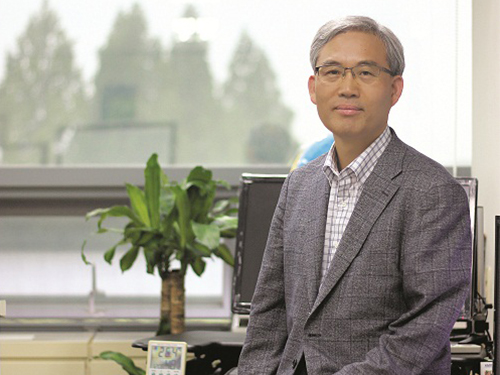 KAIST's Research Team Receives the Best Paper Award from the IEEE Transaction on Power Electronics
A research team led by Professor Chun T. Rim of the Department of Nuclear and Quantum Engineering at the Korea Advanced Institute of Science and Technology (KAIST) has received the First Prize Papers Award from the IEEE (Institute of Electrical and Electronics Engineers) Transactions on Power Electronics (TPEL), a peer-reviewed journal that covers fundamental technologies used in the control and conversion of electric power.
A total of three research papers received this award in 2015.
Each year, TPEL’s editors select three best papers among those published in the journal during the preceding calendar year. In 2014, the TPEL published 579 papers. Professor Rim’s paper was picked out as one of the three papers published last year for the First Prize Papers Award.
Entitled “Generalized Active EMF (electromagnetic field) Cancel Methods for Wireless Electric Vehicles (http://ieeexplore.ieee.org/xpls/abs_all.jsp?arnumber=6684288&tag=1),” the paper proposed, for the first time in the world, three generalized design methods for cancelling the total EMF generated from wireless electric vehicles. This technology, researchers said, can be applied to any wireless power transfer systems.
The award ceremony will be held at the upcoming conference of the 2015 IEEE Energy Conversion Congress and Expo in September in Montreal, Canada.
2015.08.27 View 13297
KAIST's Research Team Receives the Best Paper Award from the IEEE Transaction on Power Electronics
A research team led by Professor Chun T. Rim of the Department of Nuclear and Quantum Engineering at the Korea Advanced Institute of Science and Technology (KAIST) has received the First Prize Papers Award from the IEEE (Institute of Electrical and Electronics Engineers) Transactions on Power Electronics (TPEL), a peer-reviewed journal that covers fundamental technologies used in the control and conversion of electric power.
A total of three research papers received this award in 2015.
Each year, TPEL’s editors select three best papers among those published in the journal during the preceding calendar year. In 2014, the TPEL published 579 papers. Professor Rim’s paper was picked out as one of the three papers published last year for the First Prize Papers Award.
Entitled “Generalized Active EMF (electromagnetic field) Cancel Methods for Wireless Electric Vehicles (http://ieeexplore.ieee.org/xpls/abs_all.jsp?arnumber=6684288&tag=1),” the paper proposed, for the first time in the world, three generalized design methods for cancelling the total EMF generated from wireless electric vehicles. This technology, researchers said, can be applied to any wireless power transfer systems.
The award ceremony will be held at the upcoming conference of the 2015 IEEE Energy Conversion Congress and Expo in September in Montreal, Canada.
2015.08.27 View 13297 -
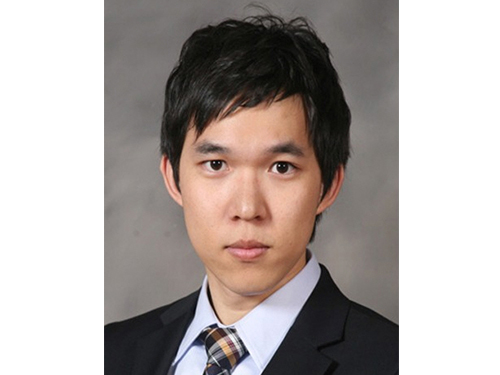 Dong-Young Lee, a Doctoral Candidate, Receives the Best Paper Award
Dong-Young Lee, a Ph.D. candidate in the Mechanical Engineering Department, KAIST, received the Best Paper Award at the 18th International Conference on Composite Structures (ICCS). The event was held in Lisbon, Portugal, on June 15-18, 2015. Mr. Lee’s adviser is Professor Dai-Gil Lee of the same department.
The ICCS is held every other year, and is one of the largest and long-established conferences on composite materials and structures in the world. At this year’s conference, a total of 680 papers were presented, among which, two papers were chosen for the Best Paper Award, including Mr. Lee’s.
The paper, entitled “Gasket-integrated Carbon and Silicon Elastomer Composite Bipolar Plate for High-temperature PEMFC,” will be published in the September issue of Composite Structures which is one of the top journals in mechanical engineering as judged by the Google Scholar Metrics rankings.
Mr. Lee dropped the conventional method of PEMFC (Proton Exchange Membrane Fuel Cells) assembly and instead developed a gasket-integrated carbon and silicone elastomer composite bipolar plate. This technology significantly increased the energy efficiency of fuel cells and their productivity.
Mr. Lee said, “I would like to thank the many people who supported me, especially my Ph.D. adviser, Professor Dai-Gil Lee. Without their encouragement, I would have not won this award. I hope my research will contribute to solving energy problems in the future.”
In addition, Professor Joon-Woo Im from Chonbuk National University, Senior Researcher Il-Bum Choi from the Agency for Defense Development, and a fellow doctoral candidate Soo-Hyun Nam from KAIST participated in this research project.
2015.07.09 View 12301
Dong-Young Lee, a Doctoral Candidate, Receives the Best Paper Award
Dong-Young Lee, a Ph.D. candidate in the Mechanical Engineering Department, KAIST, received the Best Paper Award at the 18th International Conference on Composite Structures (ICCS). The event was held in Lisbon, Portugal, on June 15-18, 2015. Mr. Lee’s adviser is Professor Dai-Gil Lee of the same department.
The ICCS is held every other year, and is one of the largest and long-established conferences on composite materials and structures in the world. At this year’s conference, a total of 680 papers were presented, among which, two papers were chosen for the Best Paper Award, including Mr. Lee’s.
The paper, entitled “Gasket-integrated Carbon and Silicon Elastomer Composite Bipolar Plate for High-temperature PEMFC,” will be published in the September issue of Composite Structures which is one of the top journals in mechanical engineering as judged by the Google Scholar Metrics rankings.
Mr. Lee dropped the conventional method of PEMFC (Proton Exchange Membrane Fuel Cells) assembly and instead developed a gasket-integrated carbon and silicone elastomer composite bipolar plate. This technology significantly increased the energy efficiency of fuel cells and their productivity.
Mr. Lee said, “I would like to thank the many people who supported me, especially my Ph.D. adviser, Professor Dai-Gil Lee. Without their encouragement, I would have not won this award. I hope my research will contribute to solving energy problems in the future.”
In addition, Professor Joon-Woo Im from Chonbuk National University, Senior Researcher Il-Bum Choi from the Agency for Defense Development, and a fellow doctoral candidate Soo-Hyun Nam from KAIST participated in this research project.
2015.07.09 View 12301 -
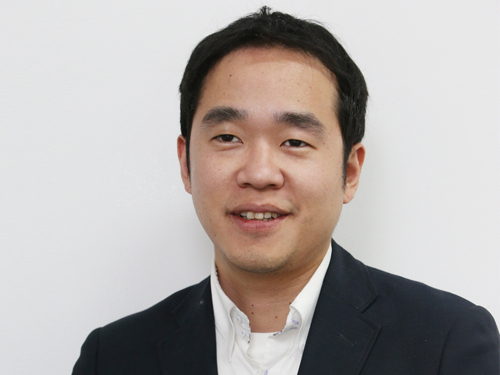 Professor Jinwoo Shin of the Electrical Engineering Department Receives the 2015 ACM SIGMETRICS Rising Star Research Award
Professor Jinwoo Shin of the Electrical Engineering Department at KAIST was selected as the recipient of the 2015 ACM SIGMETRICS Rising Star Research Award.
As a computer systems performance evaluation community, SIGMETRICS annually awards a junior researcher. He was selected as the 8th annual recipient, being the first from an Asian university.
Professor Shin was recognized for his work in theoretical analysis of stochastic queueing networks and machine learning. He said, “I would like to contribute to the expansion of computing and network theory in Korea wherein those fields are unrecognized.”
He has received numerous awards including Kennneth C. Sevcik (Best Student Paper) Award at SIGMETRICS 2009, George M. Sprowls (Best MIT CS PhD Thesis) Award 2010, Best Paper Award at MOBIHOC 2013, Best Publication Award from INFORMS Applied Probability Society 2013, and Bloomberg Scientific Research Award 2015.
2015.06.21 View 11729
Professor Jinwoo Shin of the Electrical Engineering Department Receives the 2015 ACM SIGMETRICS Rising Star Research Award
Professor Jinwoo Shin of the Electrical Engineering Department at KAIST was selected as the recipient of the 2015 ACM SIGMETRICS Rising Star Research Award.
As a computer systems performance evaluation community, SIGMETRICS annually awards a junior researcher. He was selected as the 8th annual recipient, being the first from an Asian university.
Professor Shin was recognized for his work in theoretical analysis of stochastic queueing networks and machine learning. He said, “I would like to contribute to the expansion of computing and network theory in Korea wherein those fields are unrecognized.”
He has received numerous awards including Kennneth C. Sevcik (Best Student Paper) Award at SIGMETRICS 2009, George M. Sprowls (Best MIT CS PhD Thesis) Award 2010, Best Paper Award at MOBIHOC 2013, Best Publication Award from INFORMS Applied Probability Society 2013, and Bloomberg Scientific Research Award 2015.
2015.06.21 View 11729 -
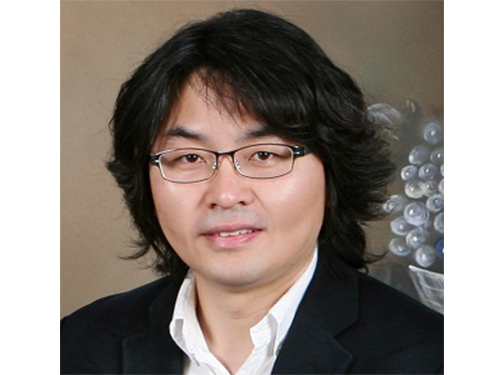 KAIST's Patina Engraving System Awarded at ACM CHI
Professor Tek-Jin Nam’s research team of the Industrial Design Department of KAIST received the Best Paper Award in the 2015 Association for Computing Machinery’s (ACM) Conference on Human Factors in Computing Systems (CHI) which was held from April 18 to 23, 2015. The team consisted of two KAIST students: Moon-Hwan Lee, a Ph.D. candidate, and Sejin Cha, a master's student. The team was the first in Asia to receive the award.
The ACM CHI represents the premier conference in the field of Human-Computer Interaction (HCI). This year’s event, held in Seoul, South Korea, was the first conference that the ACM had held in Asia in its thirty-three year history. The KAIST team’s paper, entitled “Patina Engraver: Visualizing Activity Logs as Patina in Fashionable Trackers,” ranked in the top 1% of 2,000 submitted papers.
The team developed Patina Engraver, an activity tracker, which monitors and tracks fitness-related metrics such as distances walked or run, calorie consumption, heartbeat, sleep quality, and blood pressure. The device wirelessly connects to a computer or smartphone so that it can store and utilize long-term tracking data.
However, what makes Patina Engraver, a smart wristband, different from other health trackers is its ability to display different design patterns based on users’ activity on the surface of the wristband. The research team was inspired to build this system from the fact that wearable electronics including activity trackers can be used not only as health care devices, but also as fashion items to express emotions and personalities.
Equipped with an engraving feature, the charging pad or holder for Patina Engraver draws individualized patterns to reflect the user’s activities, such as walking or running, while the device is being charged. The pattern display syncs with the frequency of usage, therefore, the more the tracker is used, the greater the number of patterns will show up.
According to the team, since Patina Engraver provides users with a personalized illustration of their activity on the tracker, users are more motivated to put on the tracker and exercise.
Professor Nam said, “This research can be applied in producing other wearable devices to enhance users’ emotional satisfaction. When wearable technology is combined with design and emotion, the industry market will quickly expand.”
Figure 1: Patina engraving system developed by KAIST research team
Figure 2: The process of engraving illustrations of the activity records onto the tracker
Figure 3: Personalized activity trackers based on activity records
2015.05.15 View 16463
KAIST's Patina Engraving System Awarded at ACM CHI
Professor Tek-Jin Nam’s research team of the Industrial Design Department of KAIST received the Best Paper Award in the 2015 Association for Computing Machinery’s (ACM) Conference on Human Factors in Computing Systems (CHI) which was held from April 18 to 23, 2015. The team consisted of two KAIST students: Moon-Hwan Lee, a Ph.D. candidate, and Sejin Cha, a master's student. The team was the first in Asia to receive the award.
The ACM CHI represents the premier conference in the field of Human-Computer Interaction (HCI). This year’s event, held in Seoul, South Korea, was the first conference that the ACM had held in Asia in its thirty-three year history. The KAIST team’s paper, entitled “Patina Engraver: Visualizing Activity Logs as Patina in Fashionable Trackers,” ranked in the top 1% of 2,000 submitted papers.
The team developed Patina Engraver, an activity tracker, which monitors and tracks fitness-related metrics such as distances walked or run, calorie consumption, heartbeat, sleep quality, and blood pressure. The device wirelessly connects to a computer or smartphone so that it can store and utilize long-term tracking data.
However, what makes Patina Engraver, a smart wristband, different from other health trackers is its ability to display different design patterns based on users’ activity on the surface of the wristband. The research team was inspired to build this system from the fact that wearable electronics including activity trackers can be used not only as health care devices, but also as fashion items to express emotions and personalities.
Equipped with an engraving feature, the charging pad or holder for Patina Engraver draws individualized patterns to reflect the user’s activities, such as walking or running, while the device is being charged. The pattern display syncs with the frequency of usage, therefore, the more the tracker is used, the greater the number of patterns will show up.
According to the team, since Patina Engraver provides users with a personalized illustration of their activity on the tracker, users are more motivated to put on the tracker and exercise.
Professor Nam said, “This research can be applied in producing other wearable devices to enhance users’ emotional satisfaction. When wearable technology is combined with design and emotion, the industry market will quickly expand.”
Figure 1: Patina engraving system developed by KAIST research team
Figure 2: The process of engraving illustrations of the activity records onto the tracker
Figure 3: Personalized activity trackers based on activity records
2015.05.15 View 16463 -
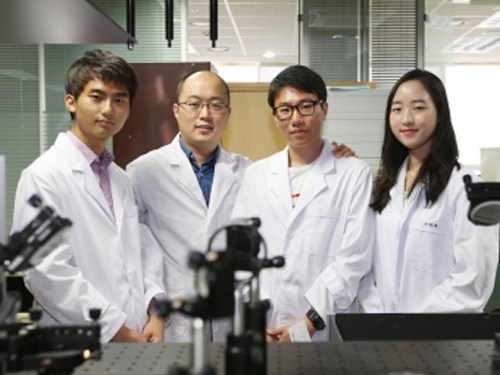 Professor YongKeun Park Produces Undergraduate Students with International Achievements
Three undergraduate students under the supervision of Professor YongKeun Park from the Department of Physics, KAIST, have published papers in globally renowned academic journals.
The most recent publication was made by YoungJu Jo, a senior in physics. Jo’s paper entitled “Angle-resolved light scattering of individual rod-shaped bacteria based on Fourier transform light scattering” was published in the May 28th edition of Scientific Reports.
Analyzing bacteria is a very important task in the field of health and food hygiene, but using the conventional biochemical methods of analysis takes days. However, observation with Jo’s newly developed method using light scattering analyzes bacteria within a matter of seconds.
SangYeon Cho from the Department of Chemistry also published papers in Cell (2012) and Nature (2013), respectively, under the guidance of Professor Park. SangYeon Cho’s outstanding research achievements were recognized by Harvard and MIT. He was accepted with a full scholarship to Harvard-MIT Health Sciences and Technology Graduate School. He will begin his graduate studies at Harvard-MIT this September.
Last March, SeoEun Lee from the Department of Biology was the recipient of the Best Paper Award by the Optical Society of Korea. She plans to pursue a doctoral degree at the College of Physicians and Surgeons, Columbia University in New York.
Professor Park said, “Undergraduate students, who are learning a variety of subjects concurrently, are at the most creative time of their lives. KAIST has offered many opportunities to undergraduate students to partake in various research programs.”
- Picture (a) and (b): Rod-shaped bacteria’s phase image and light-scattering patterns
- Picture (c): Quantitative analysis to illustrate the extraction of information from bacteria
2014.06.03 View 15949
Professor YongKeun Park Produces Undergraduate Students with International Achievements
Three undergraduate students under the supervision of Professor YongKeun Park from the Department of Physics, KAIST, have published papers in globally renowned academic journals.
The most recent publication was made by YoungJu Jo, a senior in physics. Jo’s paper entitled “Angle-resolved light scattering of individual rod-shaped bacteria based on Fourier transform light scattering” was published in the May 28th edition of Scientific Reports.
Analyzing bacteria is a very important task in the field of health and food hygiene, but using the conventional biochemical methods of analysis takes days. However, observation with Jo’s newly developed method using light scattering analyzes bacteria within a matter of seconds.
SangYeon Cho from the Department of Chemistry also published papers in Cell (2012) and Nature (2013), respectively, under the guidance of Professor Park. SangYeon Cho’s outstanding research achievements were recognized by Harvard and MIT. He was accepted with a full scholarship to Harvard-MIT Health Sciences and Technology Graduate School. He will begin his graduate studies at Harvard-MIT this September.
Last March, SeoEun Lee from the Department of Biology was the recipient of the Best Paper Award by the Optical Society of Korea. She plans to pursue a doctoral degree at the College of Physicians and Surgeons, Columbia University in New York.
Professor Park said, “Undergraduate students, who are learning a variety of subjects concurrently, are at the most creative time of their lives. KAIST has offered many opportunities to undergraduate students to partake in various research programs.”
- Picture (a) and (b): Rod-shaped bacteria’s phase image and light-scattering patterns
- Picture (c): Quantitative analysis to illustrate the extraction of information from bacteria
2014.06.03 View 15949 -
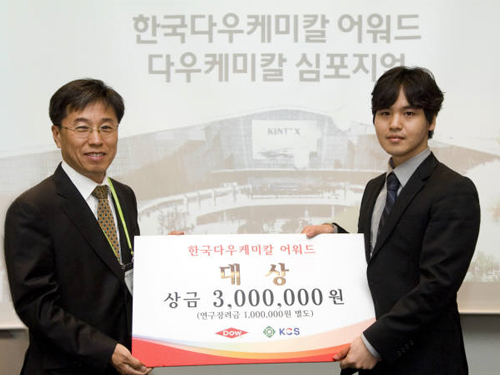 Yong-Joon Park, doctoral student, receives the Korea Dow Chemical Award 2014
Yong-Joon Park, a Ph.D. candidate of Materials Science and Engineering at KAIST, received the Korea Dow Chemical Award 2014, a prestigious recognition of the year’s best paper produced by students in the field of chemistry and materials science.
The award ceremony took place on April 18, 2014 at Ilsan Kintex, Republic of Korea.
The Korea Dow Chemical Award is annually given by Korea Dow Chemical and the Korean Chemical Society to outstanding papers produced by graduate and postdoc students. This year, a total of nine papers were selected out of 148 papers submitted.
The title of Park’s paper is “The Development of 3D Nano-structure-based New Concept Super-elastic Materials.” This material could be used in flexible electronic devices such as displays and wearable computers.
2014.05.03 View 10445
Yong-Joon Park, doctoral student, receives the Korea Dow Chemical Award 2014
Yong-Joon Park, a Ph.D. candidate of Materials Science and Engineering at KAIST, received the Korea Dow Chemical Award 2014, a prestigious recognition of the year’s best paper produced by students in the field of chemistry and materials science.
The award ceremony took place on April 18, 2014 at Ilsan Kintex, Republic of Korea.
The Korea Dow Chemical Award is annually given by Korea Dow Chemical and the Korean Chemical Society to outstanding papers produced by graduate and postdoc students. This year, a total of nine papers were selected out of 148 papers submitted.
The title of Park’s paper is “The Development of 3D Nano-structure-based New Concept Super-elastic Materials.” This material could be used in flexible electronic devices such as displays and wearable computers.
2014.05.03 View 10445 -
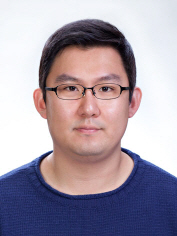 Tae-Wan Kim, a doctoral candidate, receives the best paper award from ECTC
The 2014 Electronic Components and Technology Conference (ECTC) will take place on May 27-30 in Florida, USA. Tae-Wan Kim, a Ph.D. candidate at the Department of Materials Science Engineering (MSE), KAIST, will receive the Intel Best Student Paper Award at the conference.ECTC is the premier international conference that brings together the best researchers and engineers in packaging, components and microelectronic systems science, technology and education in an environment of cooperation and technical exchange. The conference is sponsored by the Components, Packaging and Manufacturing Technology (CPMT) Society of IEEE (Institute of Electrical and Electronics Engineering).The paper describes research on novel nanofiber anisotropic conductive films for ultra fine pitch electronic package application, which was written under the guidance of Professor Kyung-Wook Paik of the MSE Department. In the past ten years, two of his students have received the best paper award from ECTC.
2014.03.14 View 14364
Tae-Wan Kim, a doctoral candidate, receives the best paper award from ECTC
The 2014 Electronic Components and Technology Conference (ECTC) will take place on May 27-30 in Florida, USA. Tae-Wan Kim, a Ph.D. candidate at the Department of Materials Science Engineering (MSE), KAIST, will receive the Intel Best Student Paper Award at the conference.ECTC is the premier international conference that brings together the best researchers and engineers in packaging, components and microelectronic systems science, technology and education in an environment of cooperation and technical exchange. The conference is sponsored by the Components, Packaging and Manufacturing Technology (CPMT) Society of IEEE (Institute of Electrical and Electronics Engineering).The paper describes research on novel nanofiber anisotropic conductive films for ultra fine pitch electronic package application, which was written under the guidance of Professor Kyung-Wook Paik of the MSE Department. In the past ten years, two of his students have received the best paper award from ECTC.
2014.03.14 View 14364 -
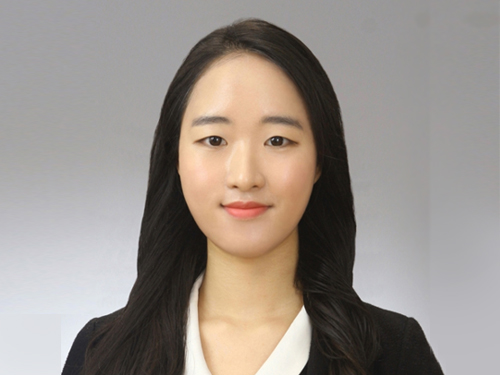 Seo-Eun Lee, an undergaruate student receives the Best Paper Award from Optical Society of Korea
Seo-Eun Lee, a student studying at KAIST’s Department of Biological Sciences, has won the Best Paper Award from Bio-Photonics Division at the 2014 Optical Society of Korea Winter Conference, held on 19th February at Daejeon Convention Center.
Only one outstanding paper per division is given an award among the total of 270 papers, and it is very unusual for an undergraduate student to win the award in the field that is not her major.
Lee has studied cell imaging using holography technology since June 2013 under the supervision of Professor Yong-Geun Park from the Department of Physics.
The Optical Society of Korea was founded in 1989, and as the largest academy in the field of optics in Korea, it holds academic presentations, seminars and lectures every year.
2014.03.06 View 11998
Seo-Eun Lee, an undergaruate student receives the Best Paper Award from Optical Society of Korea
Seo-Eun Lee, a student studying at KAIST’s Department of Biological Sciences, has won the Best Paper Award from Bio-Photonics Division at the 2014 Optical Society of Korea Winter Conference, held on 19th February at Daejeon Convention Center.
Only one outstanding paper per division is given an award among the total of 270 papers, and it is very unusual for an undergraduate student to win the award in the field that is not her major.
Lee has studied cell imaging using holography technology since June 2013 under the supervision of Professor Yong-Geun Park from the Department of Physics.
The Optical Society of Korea was founded in 1989, and as the largest academy in the field of optics in Korea, it holds academic presentations, seminars and lectures every year.
2014.03.06 View 11998 -
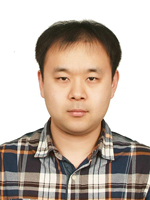 Seung-Han Lee, a doctoral student in electrical engineering, receives the best paper award from ISQED 2014
Seung-Han
Lee, a doctoral candidate in the department of electrical engineering at KAIST,
received a Best Paper Award from the International Symposium on Quality
Electronic Design (ISQED), a high-profile international conference started in 2000 to promote innovation and quality in electronic and
engineering designs through inter- and multidisciplinary approaches. The
award ceremony will take place at the 2014 ISQED on March 3-5, 2014 at the Convention
Center in Santa Clara, CA, USA.
Professor
Chong-Min Kyung, an advisor to Seung-Han, expressed his excitement about his student's achievement.
“This is
the first time a Korean has ever received the best paper award at this academic
conference. It’s great news to our student as well as to KAIST.”
The topic
of Lee’s research paper was dynamic cache data management for minimizing the
energy consumption of three-dimensional multi-processor semiconductor chips.
2014.03.03 View 13112
Seung-Han Lee, a doctoral student in electrical engineering, receives the best paper award from ISQED 2014
Seung-Han
Lee, a doctoral candidate in the department of electrical engineering at KAIST,
received a Best Paper Award from the International Symposium on Quality
Electronic Design (ISQED), a high-profile international conference started in 2000 to promote innovation and quality in electronic and
engineering designs through inter- and multidisciplinary approaches. The
award ceremony will take place at the 2014 ISQED on March 3-5, 2014 at the Convention
Center in Santa Clara, CA, USA.
Professor
Chong-Min Kyung, an advisor to Seung-Han, expressed his excitement about his student's achievement.
“This is
the first time a Korean has ever received the best paper award at this academic
conference. It’s great news to our student as well as to KAIST.”
The topic
of Lee’s research paper was dynamic cache data management for minimizing the
energy consumption of three-dimensional multi-processor semiconductor chips.
2014.03.03 View 13112 -
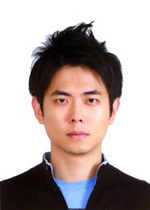 Hyun-Sik Kim, KAIST doctoral student, receives Predoctoral Achievement Award from IEEE Solid-State Circuits Society
Hyun-Sik Kim, a Ph.D. student from the Department of Electrical Engineering, is scheduled to receive the “Predoctoral Achievement Award” from the Institute of Electrical and Electronics Engineers (IEEE) Solid-State Circuit Society (SSCS) at its 2014 annual conference to be held on February 9-13 in San Francisco, USA. Kim, the first Korean student receiving the award, will also be given a 1,000 USD honorarium.
Established in 1983, the Predoctoral Achievement Award has been given to a small number of promising graduate students, which is made on the basis of academic record and potential, quality of publications, and a graduate study program well matched to the charter of SSCS. Among the previous recipients were Professor Bernhard Boser of the University of California in Berkeley and Professor Michael Flynn of Michigan University.
Kim published 15 research papers in international journals and conferences, applied for 35 domestic and international patents, and received the best paper award in human technology from Samsun Electronics for three consecutive years.
Professor Kyu-Hyung Cho of Electrical Engineering is Kim's principal advisor.
2014.01.27 View 13285
Hyun-Sik Kim, KAIST doctoral student, receives Predoctoral Achievement Award from IEEE Solid-State Circuits Society
Hyun-Sik Kim, a Ph.D. student from the Department of Electrical Engineering, is scheduled to receive the “Predoctoral Achievement Award” from the Institute of Electrical and Electronics Engineers (IEEE) Solid-State Circuit Society (SSCS) at its 2014 annual conference to be held on February 9-13 in San Francisco, USA. Kim, the first Korean student receiving the award, will also be given a 1,000 USD honorarium.
Established in 1983, the Predoctoral Achievement Award has been given to a small number of promising graduate students, which is made on the basis of academic record and potential, quality of publications, and a graduate study program well matched to the charter of SSCS. Among the previous recipients were Professor Bernhard Boser of the University of California in Berkeley and Professor Michael Flynn of Michigan University.
Kim published 15 research papers in international journals and conferences, applied for 35 domestic and international patents, and received the best paper award in human technology from Samsun Electronics for three consecutive years.
Professor Kyu-Hyung Cho of Electrical Engineering is Kim's principal advisor.
2014.01.27 View 13285 -
 Chin-Wan Chung, a professor of computer science, received the best paper award from ACM
The Korea Times reported on July 12, 2013 that Chin-Wan Chung, a professor of computer science at KAIST, won the best paper award by the Association for Computing Machinery (ACM). For the article, please click the link:
http://koreatimes.co.kr/www/news/people/2013/07/178_139132.html
2013.07.15 View 8623
Chin-Wan Chung, a professor of computer science, received the best paper award from ACM
The Korea Times reported on July 12, 2013 that Chin-Wan Chung, a professor of computer science at KAIST, won the best paper award by the Association for Computing Machinery (ACM). For the article, please click the link:
http://koreatimes.co.kr/www/news/people/2013/07/178_139132.html
2013.07.15 View 8623 -
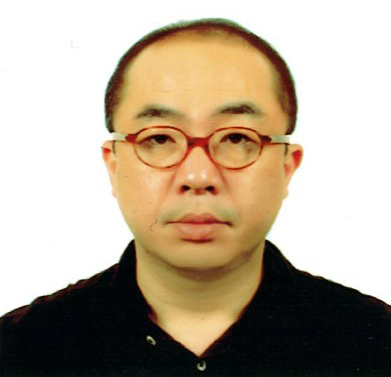 Prof. Song Chong received the IEEE William R. Bennett Prize Paper Award
The IEEE (Institute of Electrical and Electronics Engineers) Communications Society (ComSoc), a renowned global network of professionals with a common interest in advancing communications technologies, has announced the winner of the 2013 William R. Bennett Prize in the field of communications networking. The prize was given to a Korean research team led by Song Chong, Professor of Electrical Engineering at KAIST and Injong Rhee, Professor of Computer Science at North Carolina State University. In addition, Dr. Minsu Shin, Dr. Seongik Hong, and Dr. Seong Joon Kim of Samsung Electronics Co., Ltd. as well as Professor Kyunghan Lee from Ulsan National Institute of Science and Technology were recognized for their contribution.
The William R. Bennett Prize for communications networking has been awarded each year since 1994 in recognition of the best paper published in any journal financially sponsored or co-sponsored by ComSoc in the previous three calendar years. Only one paper per year is selected based on its quality, originality, scientific citation index, and peer reviews. Among the previous award winners are Robert Gallager of MIT, and Steven Low of the California Institute of Technology, and Kang G. Shin of the University of Michigan.
The Korean research team’s paper, On the Levy-Walk Nature of Human Mobility, was published in the June 2011 issue of IEEE/ACM Transactions on Networking, a bimonthly journal co-sponsored by the IEEE ComSoc, the IEEE Computer Society, and the Association for Computing Machinery (ACM) with its Special Interest Group on Data Communications (SIGCOMM).
In the paper, the research team proposed a new statistical model to effectively analyze the pattern of individual human mobility in daily life. The team handed out GPS (global positioning system) devices to 100 participants residing in five different university campuses in Korea and the US and collected data on their movements for 226 days. The mobility pattern obtained from the experiment predicted accurately how the participants actually moved around during their routines. Since publication, the paper has been cited by other papers approximately 350 times.
The team’s research results will apply to many fields such as the prevention and control of epidemics, the design of efficient communications networks, and the development of urban and transportation system.
The research team received the award on June 10th at the 2013 IEEE International Conference on Communications (ICC) held in Budapest, Hungary, from June 9-13, 2013.
Professor Song Chong
2013.07.06 View 16951
Prof. Song Chong received the IEEE William R. Bennett Prize Paper Award
The IEEE (Institute of Electrical and Electronics Engineers) Communications Society (ComSoc), a renowned global network of professionals with a common interest in advancing communications technologies, has announced the winner of the 2013 William R. Bennett Prize in the field of communications networking. The prize was given to a Korean research team led by Song Chong, Professor of Electrical Engineering at KAIST and Injong Rhee, Professor of Computer Science at North Carolina State University. In addition, Dr. Minsu Shin, Dr. Seongik Hong, and Dr. Seong Joon Kim of Samsung Electronics Co., Ltd. as well as Professor Kyunghan Lee from Ulsan National Institute of Science and Technology were recognized for their contribution.
The William R. Bennett Prize for communications networking has been awarded each year since 1994 in recognition of the best paper published in any journal financially sponsored or co-sponsored by ComSoc in the previous three calendar years. Only one paper per year is selected based on its quality, originality, scientific citation index, and peer reviews. Among the previous award winners are Robert Gallager of MIT, and Steven Low of the California Institute of Technology, and Kang G. Shin of the University of Michigan.
The Korean research team’s paper, On the Levy-Walk Nature of Human Mobility, was published in the June 2011 issue of IEEE/ACM Transactions on Networking, a bimonthly journal co-sponsored by the IEEE ComSoc, the IEEE Computer Society, and the Association for Computing Machinery (ACM) with its Special Interest Group on Data Communications (SIGCOMM).
In the paper, the research team proposed a new statistical model to effectively analyze the pattern of individual human mobility in daily life. The team handed out GPS (global positioning system) devices to 100 participants residing in five different university campuses in Korea and the US and collected data on their movements for 226 days. The mobility pattern obtained from the experiment predicted accurately how the participants actually moved around during their routines. Since publication, the paper has been cited by other papers approximately 350 times.
The team’s research results will apply to many fields such as the prevention and control of epidemics, the design of efficient communications networks, and the development of urban and transportation system.
The research team received the award on June 10th at the 2013 IEEE International Conference on Communications (ICC) held in Budapest, Hungary, from June 9-13, 2013.
Professor Song Chong
2013.07.06 View 16951